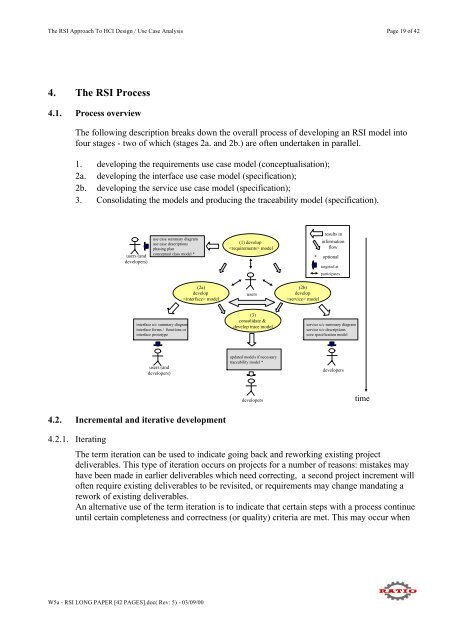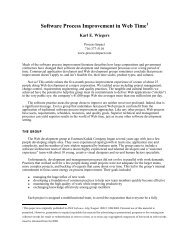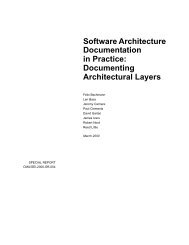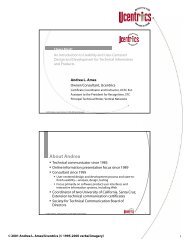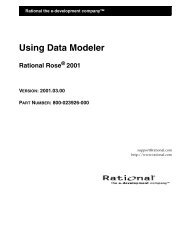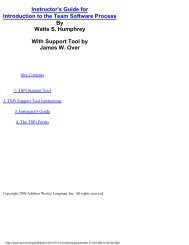RSI - A Structured Approach Use Cases and HCI Design
RSI - A Structured Approach Use Cases and HCI Design
RSI - A Structured Approach Use Cases and HCI Design
Create successful ePaper yourself
Turn your PDF publications into a flip-book with our unique Google optimized e-Paper software.
The <strong>RSI</strong> <strong>Approach</strong> To <strong>HCI</strong> <strong>Design</strong> / <strong>Use</strong> Case Analysis Page 19 of 42<br />
4. The <strong>RSI</strong> Process<br />
4.1. Process overview<br />
The following description breaks down the overall process of developing an <strong>RSI</strong> model into<br />
four stages - two of which (stages 2a. <strong>and</strong> 2b.) are often undertaken in parallel.<br />
1. developing the requirements use case model (conceptualisation);<br />
2a. developing the interface use case model (specification);<br />
2b. developing the service use case model (specification);<br />
3. Consolidating the models <strong>and</strong> producing the traceability model (specification).<br />
users (<strong>and</strong><br />
developers)<br />
use case summary diagram<br />
use case descriptions<br />
phasing plan<br />
conceptual class model *<br />
interface u/c summary diagram<br />
interface forms / functions or<br />
interface prototype<br />
users (<strong>and</strong><br />
developers)<br />
(2a)<br />
develop<br />
model<br />
4.2. Incremental <strong>and</strong> iterative development<br />
4.2.1. Iterating<br />
W5a - <strong>RSI</strong> LONG PAPER [42 PAGES].doc( Rev: 5) - 03/09/00<br />
(1) develop<br />
model<br />
users<br />
(3)<br />
consolidate &<br />
develop trace model<br />
updated models if necessary<br />
traceability model *<br />
developers<br />
(2b)<br />
develop<br />
model<br />
results in<br />
information<br />
flow<br />
* optional<br />
targeted at<br />
participates<br />
service u/c summary diagram<br />
service u/c descriptions<br />
core specification model<br />
developers<br />
The term iteration can be used to indicate going back <strong>and</strong> reworking existing project<br />
deliverables. This type of iteration occurs on projects for a number of reasons: mistakes may<br />
have been made in earlier deliverables which need correcting, a second project increment will<br />
often require existing deliverables to be revisited, or requirements may change m<strong>and</strong>ating a<br />
rework of existing deliverables.<br />
An alternative use of the term iteration is to indicate that certain steps with a process continue<br />
until certain completeness <strong>and</strong> correctness (or quality) criteria are met. This may occur when<br />
time


